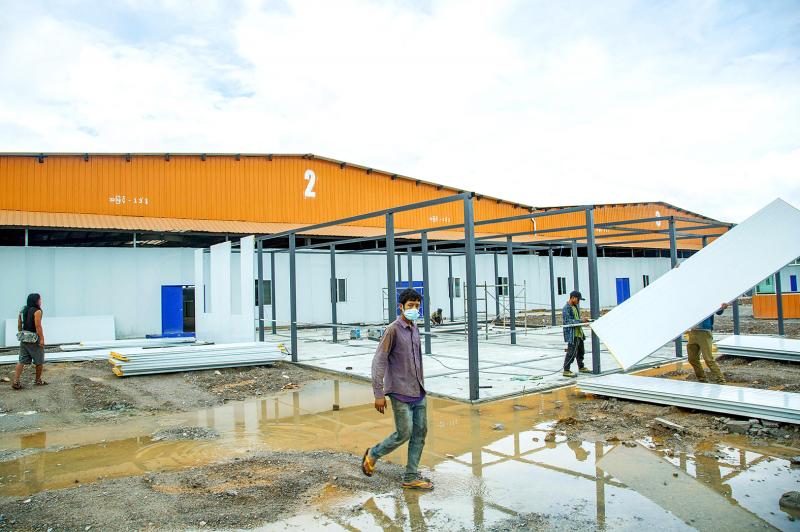Delivering vaccines to Myanmar’s junta, but also to rebel groups that are the generals’ sworn enemies, China is playing both sides to strengthen its hand in the messy politics of its southern neighbor.
Beijing has already handed over nearly 13 million doses to the generals, who in February ousted the government of civilian leader Aung San Suu Kyi and plunged Myanmar and its healthcare system into chaos.
The junta has appeared powerless to halt the spread of the virus, spooking authorities on the other side of its porous, 2,000km frontier with China, where officials are waging a “zero case” war on COVID-19.

Photo: AFP
So Beijing has quietly shipped thousands of vaccines, medical workers and construction materials for quarantine centers, multiple rebel groups told reporters.
Chinese Red Cross staff “come to help us sometimes ... to help us prevent the COVID pandemic, but they did not come to stay here,” said Colonel Naw Bu, spokesman for the Kachin Independence Army (KIA).
Naw Bu’s group, which numbers in the thousands, controls territory in Myanmar’s northern jade-rich hills.
“They just came for a while and went back,” he said.
The KIA is one of Myanmar’s more than 20 ethnic rebel groups — many of whom control swathes of remote border territory — who have fought each other and the military over the drugs trade, natural resources and autonomy.
However, they are all vulnerable to COVID-19.
The Shan State Progress Party rebel group has vaccinated 1,000 people in areas under its control with Chinese vaccines, a spokesperson told reporters.
It had ordered half a million doses, he said.
“Good neighbor” China had also promised to supply doses to the Ta’ang National Liberation Army, based in nearby territory, spokesman Brigadier General Tar Phone Kyaw told reporters.
Meanwhile, in the border town of Muse, men work on a new quarantine center that is to house up to 1,000 beds for traders keen to resume business with China.
The workers are Burmese nationals, but the building materials were all provided by authorities in China’s Yunnan Province.
The aid is receiving none of the fanfare of Beijing’s diplomacy elsewhere in Asia and across Africa.
“China will as always, according to their needs, provide necessary assistance and support to the Myanmar people in their fight against the epidemic,” a Chinese Ministry of Foreign Affairs spokesman said when asked if Beijing was helping insurgent groups fight COVID-19.
Enze Han (韓恩澤), a University of Hong Kong associate professor in public administration, said it “makes sense” for authorities across the border to help.
“If China wants to protect itself from COVID ... it needs to create a buffer zone,” Han told reporters.
Ethnic Chinese groups, using Chinese SIM cards and currency, live along the border in areas “basically grafted onto the lower belly of China,” said David Mathieson, an analyst formerly based in Myanmar.
If major clashes between rebels and the military broke out — as they did in 2017, sending thousands fleeing into China — it would be a “worst-case scenario” for Beijing, Mathieson said.

ANGER: A video shared online showed residents in a neighborhood confronting the national security minister, attempting to drag her toward floodwaters Argentina’s port city of Bahia Blanca has been “destroyed” after being pummeled by a year’s worth of rain in a matter of hours, killing 13 and driving hundreds from their homes, authorities said on Saturday. Two young girls — reportedly aged four and one — were missing after possibly being swept away by floodwaters in the wake of Friday’s storm. The deluge left hospital rooms underwater, turned neighborhoods into islands and cut electricity to swaths of the city. Argentine Minister of National Security Patricia Bullrich said Bahia Blanca was “destroyed.” The death toll rose to 13 on Saturday, up from 10 on Friday, authorities

Local officials from Russia’s ruling party have caused controversy by presenting mothers of soldiers killed in Ukraine with gifts of meat grinders, an appliance widely used to describe Russia’s brutal tactics on the front line. The United Russia party in the northern Murmansk region posted photographs on social media showing officials smiling as they visited bereaved mothers with gifts of flowers and boxed meat grinders for International Women’s Day on Saturday, which is widely celebrated in Russia. The post included a message thanking the “dear moms” for their “strength of spirit and the love you put into bringing up your sons.” It

DEBT BREAK: Friedrich Merz has vowed to do ‘whatever it takes’ to free up more money for defense and infrastructure at a time of growing geopolitical uncertainty Germany’s likely next leader Friedrich Merz was set yesterday to defend his unprecedented plans to massively ramp up defense and infrastructure spending in the Bundestag as lawmakers begin debating the proposals. Merz unveiled the plans last week, vowing his center-right Christian Democratic Union (CDU)/Christian Social Union (CSU) bloc and the center-left Social Democratic Party (SPD) — in talks to form a coalition after last month’s elections — would quickly push them through before the end of the current legislature. Fraying Europe-US ties under US President Donald Trump have fueled calls for Germany, long dependent on the US security umbrella, to quickly

In front of a secluded temple in southwestern China, Duan Ruru skillfully executes a series of chops and strikes, practicing kung fu techniques she has spent a decade mastering. Chinese martial arts have long been considered a male-dominated sphere, but a cohort of Generation Z women like Duan is challenging that assumption and generating publicity for their particular school of kung fu. “Since I was little, I’ve had a love for martial arts... I thought that girls learning martial arts was super swaggy,” Duan, 23, said. The ancient Emei school where she trains in the mountains of China’s Sichuan Province